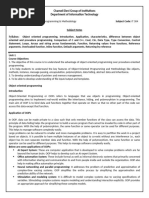object_oriented_programming
Uploaded by
Αρχοντης Αρχοντηςobject_oriented_programming
Uploaded by
Αρχοντης ΑρχοντηςObject-Oriented Programming
Object-Oriented Programming (OOP) is a programming paradigm centered around the concept of
objects, which combine data and behavior into a single entity. In OOP, real-world entities are
modeled as objects that encapsulate both their attributes (fields) and the operations they can
perform (methods). This approach emphasizes principles such as encapsulation, inheritance,
polymorphism, and abstraction, leading to software that is modular, reusable, and easier to
maintain. One of the key advantages of OOP is its alignment with human cognition: programmers
can think in terms of objects interacting with one another rather than manipulating raw data
structures. Popular object-oriented languages include Java, C++, Python, and C#. OOP enables the
development of complex software systems, such as graphical user interfaces, video games, and
enterprise applications, by promoting code reuse through class hierarchies and design patterns.
Despite its popularity, OOP has also been critiqued for leading to overly complex inheritance
structures and tight coupling between components, leading to complementary paradigms like
functional and component-based programming. Nevertheless, OOP remains a foundational
approach in modern software engineering education and practice.
You might also like
- Principles of Object-Oriented Programming PDFNo ratings yetPrinciples of Object-Oriented Programming PDF17 pages
- Object-Oriented Programming (OOP) : ObjectsNo ratings yetObject-Oriented Programming (OOP) : Objects1 page
- Evolution of OOP: Problem Solving in OO Paradigm100% (3)Evolution of OOP: Problem Solving in OO Paradigm3 pages
- Object-Oriented-Programming-OOP-ConceptsNo ratings yetObject-Oriented-Programming-OOP-Concepts7 pages
- Chapter 6: Basic Concepts of OOP: Object Oriented Programming (OOP)No ratings yetChapter 6: Basic Concepts of OOP: Object Oriented Programming (OOP)3 pages
- Software Evolution: Machine Language Assembly Language Procedure Programming Object Oriented Programming (OOP)No ratings yetSoftware Evolution: Machine Language Assembly Language Procedure Programming Object Oriented Programming (OOP)17 pages
- Introduction To Object-Oriented Programming (OOP)No ratings yetIntroduction To Object-Oriented Programming (OOP)14 pages



























































